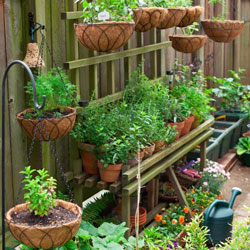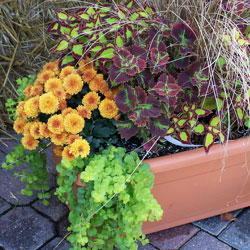All containerized plants that are considered hardy in your zone can spend the winter outdoors, but you do need to take a little special care to keep them safe and comfortable as temperatures drop. Despite their hardiness, winter is still a challenging season, but it is possible to keep your container plants healthy until the days grow longer and warmer again.
Options to Overwinter Your Container Plants
- In the late summer or fall, removed the plant from its container and plant it in the ground while the soil is still warm. Another method is to bury the pot, with the plant in it, in the garden and remove the pot the following spring. Both of these methods will help insulate the root system, preventing it from freezing solid and killing the root system.
- Place containerized plants in an unheated garage but along a heated wall. This is an excellent method for very large pots or porous pots that tend to break apart from the constant cycle of freezing and thawing, and so would not be very hardy if buried. For extra root protection and insulation, wrap the pots in plastic bubble wrap or wrap an old comforter or quilt around the pots.
- Group pots together along the sunny side of your house or shed. If this area is windy, create a windscreen with stakes and burlap. Place bales of straw or hay around the perimeter of the grouping to further protect plants from cold winds. Fill in areas between pots with mulch, shredded leaves, grass clippings, or hay for insulation. Lay evergreen branches or place a layer of mulch on top of the pots for additional protection.
- Use a cold frame covered with plastic or Reemay fabric to help control temperatures and reduce light as well, helping plants stay dormant in winter. It will still be necessary to use mulch, shredded leaves, or hay around and in-between pots for insulation. Rodent control, such as Havahart traps, may be necessary when using this method.
Watering Container Plants in Winter
Make sure that plants go into the winter with moist soil so that there is water available to plant roots. Check soil moisture occasionally, never allowing it to dry completely. It is also a very good idea to spray needled and broadleaf evergreens with an anti-desiccant. This acts as a protective coating for plant foliage and stems as it helps them retain moisture.
With just a little care and forethought, you can easily prepare containers for winter without risking the plants and arrangements you have so carefully cultivated.








